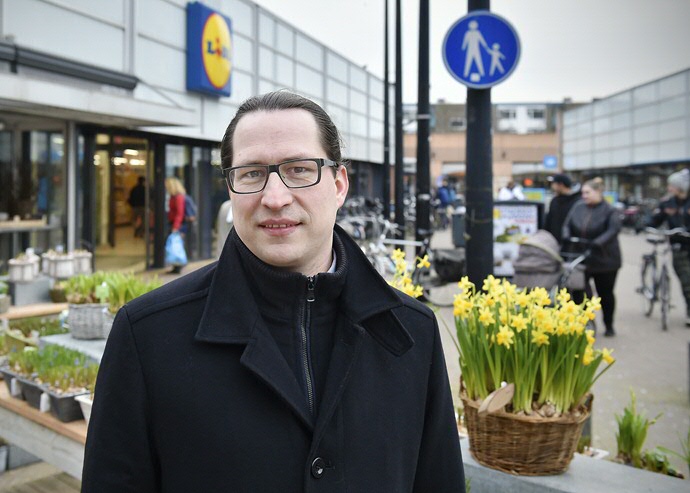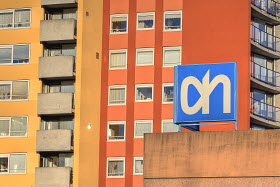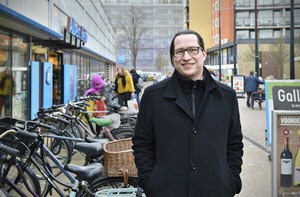Jochen Mierau: ‘The health differences in the Northern Netherlands are bizarre’

As a small boy he experienced the enormous differences between East and West Berlin. Now he has set his sights on reducing the shocking health differences in our region. A discussion with Jochen Mierau, the tireless initiator of the Aletta Jacobs School of Public Health.
Text: Riepko Buikema / Communication
There’s a momentary pause in the conversation in the lobby of the UMCG. Two young fathers are recalling a time when they had no choice but to be here, because their families needed medical care. A look of recognition. And of gratitude. What an incredible luxury that we in Groningen can rely on such an excellent hospital.
Born in Jena in East Germany, Jochen Mierau (35) knows that such facilities can’t be taken for granted. He moved to Berlin at a young age and witnessed the fall of the Wall as a six-year-old. ‘I can remember the big procession with flags to celebrate the 40th anniversary of the GDR on 7 October 1989. A month later it was all over. From one day to the next you find yourself in a very different age, with different mores. Something like that stays with you. People could leave and they did. There was an exodus from my school. PE and swimming lessons were cancelled because there was no one left.’
New mission
Mierau’s family also left. In 1991, his father found a job at the Biology Centre of the University of Groningen. Following in the footsteps of his father, mother (philosophy) and brother (literature), Jochen also chose a career in academia in Groningen. He was conferred a PhD for a study of the sustainability of the Dutch pension system in an era of ageing populations, and then shifted his focus to health care. ‘The same problems are at play there. A smaller group of young people must bear the costs for a larger group of old people. The policy options are the same with both problems.’ This gave Mierau a new mission, which he is working on heart and soul: reducing the health differences in the northern Netherlands.

The most striking differences
Because don’t be mistaken, Mierau warns, just around the corner are the most striking differences. ‘Cycle through Groningen from Helpman to the Selwerd or Vinkhuizen neighbourhoods, and the average life expectancy of the residents that you pass on your way drops by a few years. In the space of five kilometres. That’s bizarre. The healthcare system doesn’t change during that ride. Everyone can be treated at the same hospital and be insured by the same health insurers. It’s only the surroundings that differ a bit between the north and south of the city. The economic status of the family that you are born in strongly determines your life expectancy.’
‘In that respect, the Northern Netherlands paints a very interesting picture. It’s a small region with big differences. The life expectancy for a man from Pekela is 76.5, whereas in more prosperous municipalities in Friesland it’s 81 or 82. We also see these big differences in spending on care. This ranges from EUR 2,000 to 2,500 in insured care per year. We also see such differences between countries and continents. It’s exciting to be right on top of this in the Northern Netherlands and to try to draw conclusions that will apply to other parts of the world.’
Aletta Jacobs School of Public Health
The aim is for the Aletta Jacobs School of Public Health, which Mierau initiated, to become the platform for this. A new partnership between all UG faculties, UMCG, Hanze University of Applied Sciences, health insurers, Public Health Service (GGD) and municipalities inspired by the success of initiatives such as the Harvard T.H. Chan School of Public Health. Together for more healthy years is its motto. Prevention is the magic word. ‘Healthcare was always very focused on increasing the average life expectancy. Now it’s time to do something about the distribution of that figure. There is a clear social problem that needs to be addressed. How do we ensure that everyone, regardless of socio-economic status, has the same health?’
No idea whatsoever
That is no mean feat, because we have no idea whatsoever of how these socio-economic differences lead to health differences. ‘Why is a poorer person often also less healthy? Education, nutrition, lifestyle, earthquakes and recessions all play a role. But how? Which things can we influence to reduce the differences and how can we do that?’

And that’s when it really becomes interesting. ‘If we try to bring about change in a neighbourhood, will this be effective? And if it is, can we achieve the same in other places? Or was the success only due to a very empathetic person in that specific neighbourhood, meaning that the presence of that person was more important than what exactly they did?’
Health policy for the Selwerd neighbourhood
A good example is the ‘Healthy Ageing and Neighbourhood Improvement in the City of Groningen’ project. Here the Municipality of Groningen and UG researchers are working together to develop and evaluate health policy for the Selwerd neighbourhood. Mierau argues that there is no such thing as the supposed contradiction between fundamental and policy research. ‘The basis for good policy is that you know which button to turn to achieve a certain effect. And that is the academic question too: what is the causal link between a and b and what are the steps in between? That is why it is good that academia and health care are trying to move closer together. The Aletta Jacobs School of Public Health tries to put this collaboration into practice.’
The ultimate test
The buck mustn’t stop with big ambitions and fancy words. ‘A good institute, good academic articles, good grants: that’s all very well. But for me the crux is the question of what you have achieved for the region. What have you done for Groningen? This question must be pivotal. The ultimate test is if we and our partners in the region can manage to reduce health differences in the Northern Netherlands and how we draw conclusions from this for other regions. Only if we succeed in this will the Aletta Jacobs School of Public Health be a true success.’
More information
More news
-
10 February 2026
‘Regeneration starts where courage meets imagination’
-
09 December 2025
Are robots the solution?
